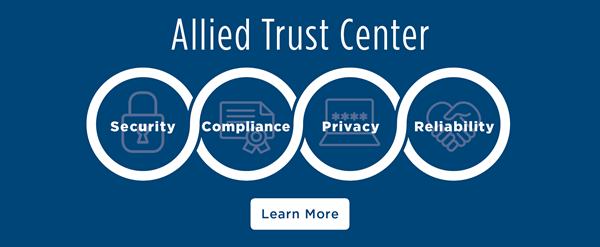Cybersecurity Awareness Month Series [PART 4] — 3 Tips to Build Consumer Trust on Data Security
View Part 1 here: 5 Password Protection Fallacies
View Part 2 here: Data Compliance in a Digital Era
View Part 3 here: What is 'Privacy by Design' and Why Does it Matter?
In 2019, over 800 reported breaches impacted nearly 500 million accounts according to the Identity Theft Resource Center. In the first half of 2020 there have been 540 reported breaches impacting an estimated 160 million accounts. Consumers are distressingly familiar with data breach headlines and the potential for their personal information to be compromised, even as demand continues to grow for enhanced digital, online services. COVID-19 has only accelerated this digital adoption.
BAI’s Banking Outlook reports that 83% of financial service organizations feel an increased sense of urgency to implement digital initiatives. COVID-19 has only served to increase this pressure as digital use increased at the onset of the pandemic in March and April. However, with an increase in digital banking, there’s heightened security concerns, including fraud attempts, technology failures, and user errors. According to 2020 BAI research, 38% of consumers across all generations report that their biggest frustration with digital banking remains the fear of fraud and security concerns.
Trust is a critical component financial institutions need in order to provide a user experience that is secure, responsive, and easy to use. As more services move online, there are some practices institutions can put in place to help build consumer trust, while also putting practical, preventative protocols in place to help keep user data secure.
Tip #1: Create a Communications Plan
In the event of a data breach, it’s important your organization is prepared to act and communicate transparently. A documented communications plan identifies processes for managing response activities and recovering operations without neglecting security or compliance. It should assign a chain of command and set clear decision-makers. A communications plan ensures that the impact of a service disruption to consumers is minimized, but well communicated so appropriate actions can be taken by both internal employees and consumers.
Tip #2: Communicate Across Multiple Channels
Communication channels are important in order to process and share necessary information. These tools enable self-service options that offer convenience for the member and enhanced efficiencies for financial institutions to gather information and manage requests in a timely manner. Some digital communication tools, include:
- Automated phone calls
- Chat bots
- Online portals
- Text messaging
- Video
Financial institutions notice improved service operations by providing members with various ways to take action on their own, however fraud does remain a growing concern. It will remain equally important that outside of convenience, these channels continue to protect consumer data and should be leveraged to keep consumers informed on data security best practices.
Tip #3: Prepare for the Data Breach
By planning for the worst, your organization can be prepared to respond in the best way possible. In order to make sure your data management systems are trustworthy and reliable it’s important to have protocols and a plan in place:
- Routinely assess the quality of the controls and protocols in place: Routine audits by internal and trusted third parties help ensure that defects are caught and remediated early. Processes such as code reviews, non-production environments, and both automated and manual QA testing can help find issues early in the process.
- Prepare a crisis plan in the event of a data breach: Establishing a business continuity plans helps ensure that consumer disruptions are minimized to the consumer and the organization is prepared to quickly respond to the breach event and continue to keep unaffected data secure and protected against additional losses.
With a proactive plan in place, financial institutions can be best prepared to meet and respond to data security concerns, and stay focused on what matters most: continuing to serve consumers with the best banking experience possible.
Allied Solutions has experienced the firsthand value of committing to a strong, customer-centric data privacy framework. Visit the "Allied Trust Center" to learn more about our data security practices.

